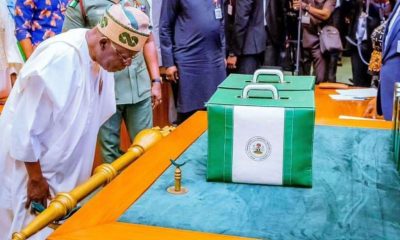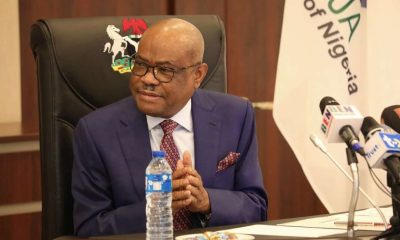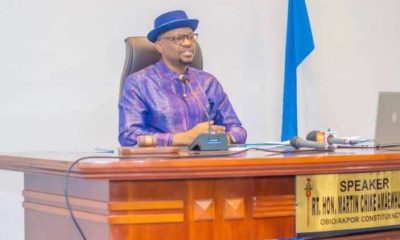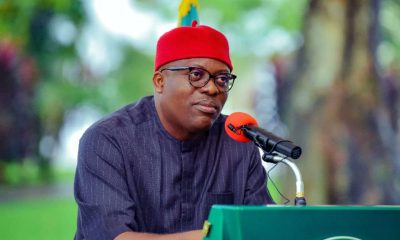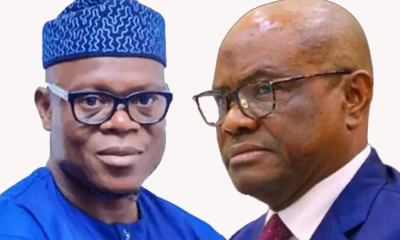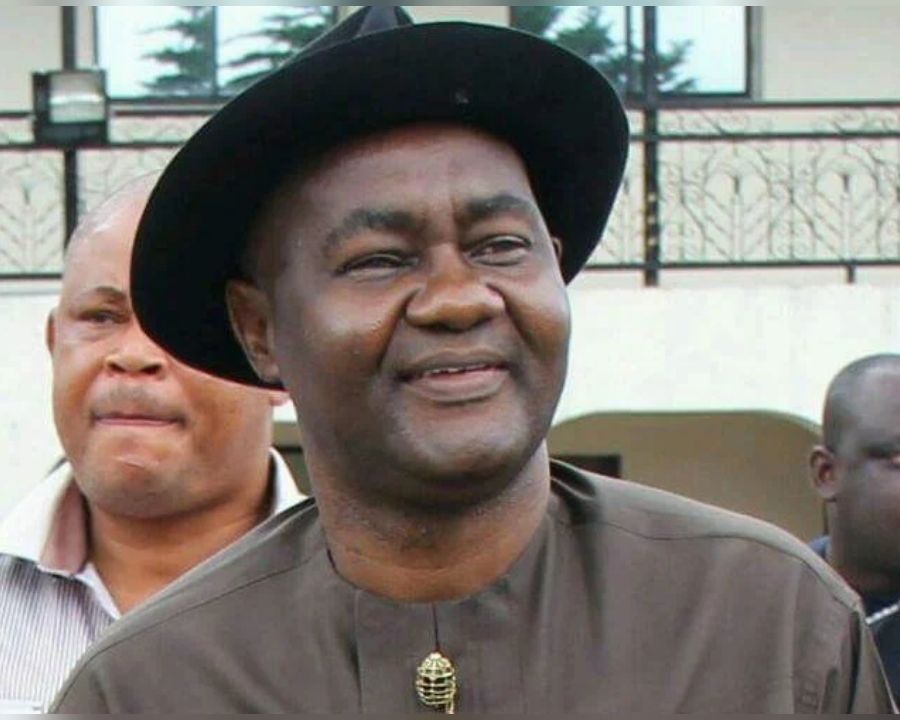Politics
Rivers State: Anxiety mounts over Supreme Court’s delay on suit
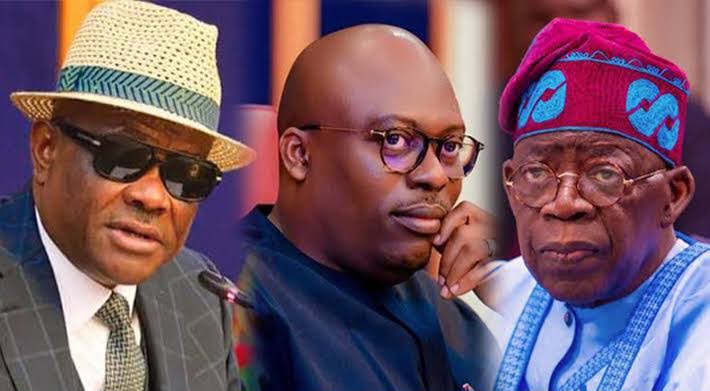
Over a month after a constitutional challenge brought by 11 governors of the opposition Peoples Democratic Party (PDP) against the controversial declaration of a state of emergency in Rivers State and the suspension of its elected leadership, the Supreme Court has yet to fix a date for hearing.
President Bola Tinubu, has, meanwhile, asked the apex court to dismiss the opposition governor’s suit.
The delay has sparked growing unease across legal and political circles, fueling suspicions that the judiciary is deliberately playing for time to allow the six-month emergency period to run its course to save President Tinubu a legal embarrassment.
With the clock ticking and tensions simmering, critics argue that the court’s inaction not only undermines public trust in the judiciary, but may also signal a troubling erosion of judicial independence. For many, the Rivers case is no longer just about the law, it is a test of Nigeria’s constitutional order and the integrity of its democratic institutions.
The legal challenge, filed over a month ago by governors from Adamawa, Enugu, Osun, Oyo, Bauchi, Akwa Ibom, Plateau, Delta (then a PDP state), Taraba, Zamfara, and Bayelsa, seeks to nullify President Tinubu’s March 18, 2025 proclamation that suspended Governor Siminalayi Fubara, his deputy, Prof. Ngozi Odu, and the entire State House of Assembly. In their place, the President installed retired Vice Admiral Ibok Ete Ibas as a Sole Administrator, who has in turn dismantled all political structures in the state set up by Fubara, such as the local governments, and other political appointments into statutory agencies.
The PDP governors argue that the President’s action amounts to a flagrant abuse of power and a violation of the 1999 Constitution. Their suit, SC/CV/329/2025, poses critical questions: Can a Nigerian president suspend elected state officials? Does the Constitution allow for the imposition of an unelected administrator in a state under emergency rule?
Legal Consensus
Legal observers widely agree that the Constitution does not grant the president such sweeping powers.
“The Constitution is clear,” said Lagos-based constitutional lawyer, Chinyere Okonkwo. “Section 305 allows the president to declare a state of emergency under specific circumstances—war, natural disaster, or a breakdown of public order. Even then, it does not empower him to sack elected officials. The courts must say so clearly and quickly.”
But so far, the court have been silent. The Supreme Court’s delay in assigning a hearing date is now becoming the most controversial aspect of the entire saga. Many observers point to the speed with which the court acted in politically sensitive cases in the past.
During the February 2023 naira swap crisis, for instance, governors opposed to the Buhari administration’s currency redesign filed a suit. Within four weeks, the Supreme Court not only assigned a hearing date but delivered judgment—all before the general elections. That contrast is not lost on analysts and the public.
“The naira redesign case was decided with urgency because it had political consequences for elections,” said Dr. Kabiru Suleiman, a political analyst and lecturer at the University of Abuja. “But this one—which involves the suspension of an elected governor—has been in limbo for over a month. The Supreme Court’s inaction suggests it may be hedging.”
That suspicion is growing. According to insiders close to the legal teams involved, justices have offered no timeline or communication regarding when the case will be heard.
Several analysts now believe the Supreme Court may be deliberately stalling in a bid to avoid making a ruling that could embarrass the Tinubu administration. The thinking, they argue, is simple: If the court delays long enough, the emergency period—initially set for six months—will lapse by September 2025, rendering the case moot.
“This is a dangerous strategy,” warned rights activist and lawyer, Ayo Obe. “If the court allows this kind of constitutional violation to go unaddressed by simply running down the clock, it will set a precedent that undermines the rule of law.”
That fear is echoed by civil society groups like the Socio-Economic Rights and Accountability Project (SERAP), which issued a statement last week condemning the delay.
“Deliberate inaction by the judiciary in such a pivotal case signals a systemic failure,” the group said. “The courts are not just passive arbiters. They are defenders of constitutional order.”
PDP Governors’ Legal Fire-power
In anticipation of a fierce legal showdown, the PDP governors have marshaled an elite team of 11 Senior Advocates of Nigeria (SANs), including legal luminaries like Bolaji Ayorinde (SAN), Eyitayo Jegede (SAN), and Kamaldeen Ajibade (SAN). They argue that Tinubu’s actions violate Sections 1(2), 5(2), 176, 180, 188, and 305 of the Constitution, which define the tenure and removal processes of governors.
“This is not about politics,” said a source close to the legal team. “It’s about defending the Constitution and federalism. If we lose this, it’s not just Rivers. Any state can be taken over tomorrow.”
National Assembly’s Legal Gambit
In a surprise twist, the National Assembly filed its own suit last Friday, challenging the legal standing of the PDP governors’ case. The federal legislature, which previously endorsed the emergency rule through a voice vote, instead of the constitutionally mandated vote count, which the only way to determine a two-thirds majority, is now seeking to legitimize its approval of Tinubu’s actions.
Critics say the legislature’s position confirms its growing role as an enabler of executive overreach.
“The National Assembly has become a rubber stamp,” said Dr. Felix Anozie, political science professor. “They didn’t hold a real debate. They just endorsed the President’s decision and are now trying to shield him from judicial scrutiny.”
The implications for the judiciary, many say, are dire. In a country where public trust in institutions is already low, the perception that the Supreme Court is complicit in executive overreach may be its most damaging blow yet.
“People are asking whether the courts can still protect democracy,” said Abuja-based analyst, Tunde Alade. “If they can’t even set a hearing date for such a major constitutional crisis, what else are they compromised on?”
The Supreme Court, some say, is walking a tight-rope—caught between constitutional duty and political pressure from the presidency.
Politics of 2027 Loom Large
For many observers, the Rivers State crisis cannot be divorced from the wider political context of the 2027 elections. Rivers State, with its oil wealth and electoral muscle, has long been a PDP stronghold and is considered one of the most critical battlegrounds in national elections.
The political rivalry between Gov. Fubara and his predecessor-turned-minister, Nyesom Wike, now allied with Tinubu, has turned the state into a chessboard of federal and local power plays.
“This is not just governance. This is political conquest,” said veteran journalist and columnist, Tola Adeniyi. “Tinubu needs Rivers under control ahead of 2027. The emergency rule is the shortcut.”
Adeniyi, who has been critical of Tinubu’s centralization of power, said the President is testing how far he can stretch constitutional boundaries without resistance.
In the streets of Port Harcourt and across the Niger Delta, civil society groups have begun organizing protests and town halls calling for a return to constitutional order.
Protesters, including women, students and youth activists, have rallied around Gov. Fubara, who continues to insist he remains the legitimate governor of the state.
“We did not elect a Sole Administrator,” shouted one protester at a recent rally in Port Harcourt. “We voted for Fubara!”
Recently, Rivers State women walked out on the First Lady, Senator Oluremi Tinubu, represented by the wife of the Sole Administrator, Mrs. Ibas, during an empowerment program in Port Harcourt, insisting that she, as well as her husband, vice Admiral Ibas (retd) is unknown in law.
Groups like the Transition Monitoring Group (TMG) have also warned that continued judicial silence could embolden more acts of constitutional impunity.
“The judiciary must wake up,” said TMG’s national coordinator, Dr. Musa Goni. “The Supreme Court is not just watching history—it is writing it.”
Ethnic, Regional Tensions Escalate
The fallout from the emergency rule has not been limited to legal circles. Ethnic and regional tensions have also been inflamed, particularly following controversial remarks from pro-Tinubu militants like Asari Dokubo, who questioned Fubara’s ethnic identity as Ijaw.
Analysts warn that if not checked, the situation in Rivers could explode into violence, with implications for national stability.
“This is playing with fire,” said human rights lawyer, Gloria Igbokwe. “The combination of political manipulation, judicial delay, and ethnic provocation is a recipe for chaos.”
For many Nigerians, the core issue now is not just whether the President acted unconstitutionally, but whether the judiciary dares to call him out.
Legal commentator Olumide Ojo summed it up this way: “We are at a crossroads. If the Supreme Court fails to act, it will confirm the worst fears about our democracy. If it acts, it could help save it.”
As of last week, no date has been fixed for the hearing, and the silence from the court remains deafening. But across Nigeria, the noise is growing louder: from opposition politicians, legal minds, activists, and everyday citizens demanding that justice not only be done, but be seen to be done.
Observers have pointed to similar democratic crises in countries like Pakistan, Brazil, and Kenya, where courts have either stepped up to check executive power or failed spectacularly, leading to deeper national crises.
In Kenya, the Supreme Court’s 2017 nullification of a presidential election result was hailed globally as an act of judicial bravery. In contrast, Brazil’s democratic institutions came under intense strain during the Bolsonaro presidency due to the judiciary’s perceived indecisiveness on key constitutional matters.
“Nigeria has a choice,” said Professor Aisha Abdulkadir, a constitutional law expert. “We can be a country where courts are respected because they uphold the law, or a country where courts are feared because they serve the powerful.”
The Rivers emergency rule saga has become more than a political dispute; it has become a defining constitutional crisis. At stake is the very structure of Nigeria’s federal system, the independence of the judiciary, and the future of constitutional democratic governance.
For a court that once prided itself as the last hope of the common man, the delay in hearing the PDP governors’ suit risks turning that hope into despair.
Whether the court will eventually rise to the occasion, or quietly allow the emergency period to expire without judgment, remains to be seen. But for now, anxiety mounts, questions linger, and confidence in Nigeria’s most powerful legal institution continues to erode.


